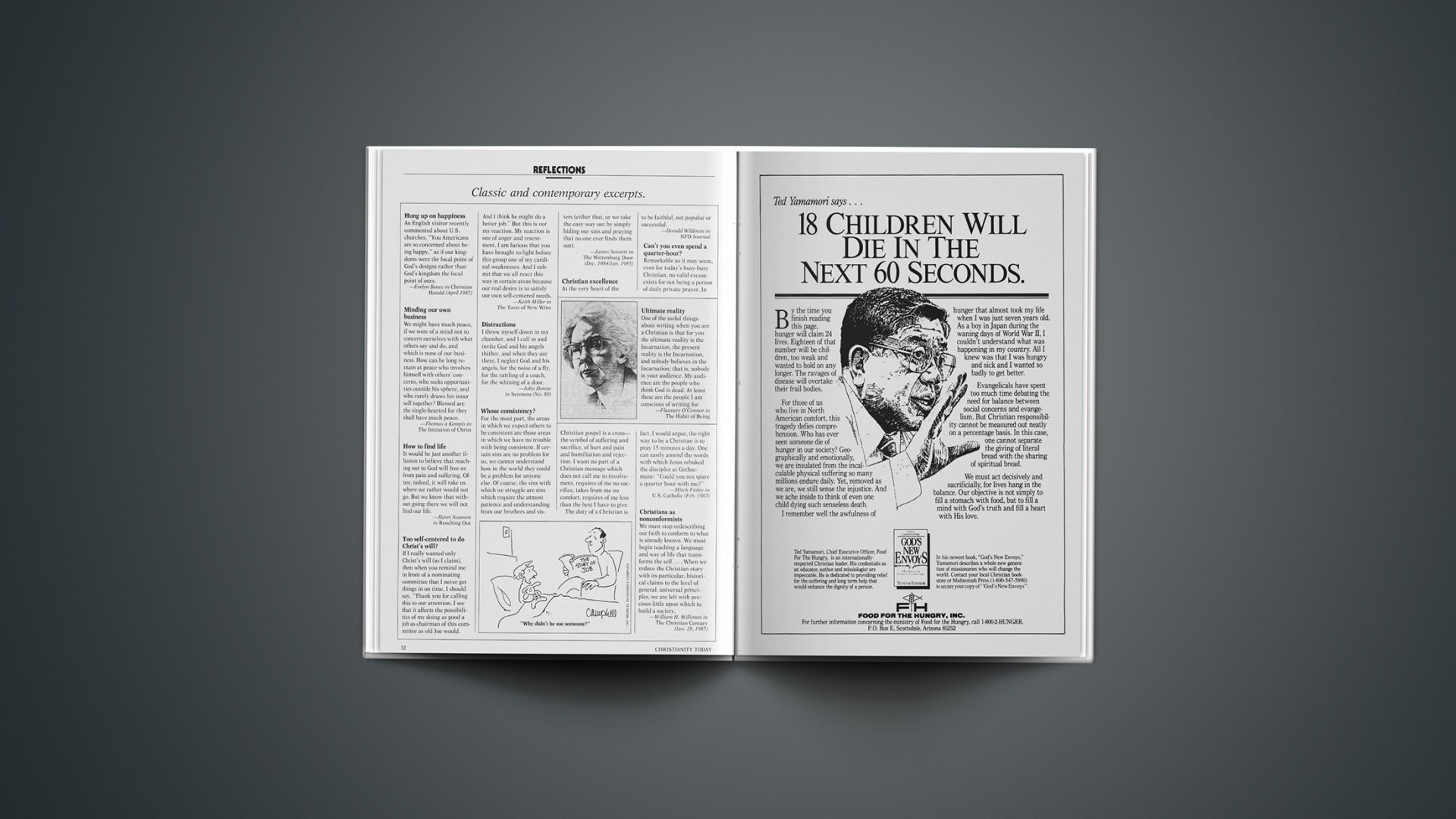Hung up on happiness
An English visitor recently commented about U.S. churches, “You Americans are so concerned about being happy,” as if our kingdoms were the focal point of God’s designs rather than God’s kingdom the focal point of ours.
—Evelyn Bence in Christian Herald (April 1987)
Minding our own business
We might have much peace, if we were of a mind not to concern ourselves with what others say and do, and which is none of our business. How can he long remain at peace who involves himself with others’ concerns, who seeks opportunities outside his sphere, and who rarely draws his inner self together? Blessed are the single-hearted for they shall have much peace.
—Thomas a Kempis in The Imitation of Christ
How to find life
It would be just another illusion to believe that reaching out to God will free us from pain and suffering. Often, indeed, it will take us where we rather would not go. But we know that without going there we will not find our life.
—Henri Nouwen in Reaching Out
Too self-centered to do Christ’s will?
If I really wanted only Christ’s will (as I claim), then when you remind me in front of a nominating committee that I never get things in on time, I should say, “Thank you for calling this to our attention. I see that it affects the possibilities of my doing as good a job as chairman of this committee as old Joe would. And I think he might do a better job.” But this is not my reaction. My reaction is one of anger and resentment. I am furious that you have brought to light before this group one of my cardinal weaknesses. And I submit that we all react this way in certain areas because our real desire is to satisfy our own self-centered needs.
—Keith Miller in The Taste of New Wine
Distractions
I throw myself down in my chamber, and I call in and invite God and his angels thither, and when they are there, I neglect God and his angels, for the noise of a fly, for the rattling of a coach, for the whining of a door.
—John Donne in Sermons (No. 80)
Whose consistency?
For the most part, the areas in which we expect others to be consistent are those areas in which we have no trouble with being consistent. If certain sins are no problem for us, we cannot understand how in the world they could be a problem for anyone else. Of course, the sins with which we struggle are sins which require the utmost patience and understanding from our brothers and sisters (either that, or we take the easy way out by simply hiding our sins and praying that no one ever finds them out).
—James Sennett in The Wittenburg Door (Dec. 1984/Jan. 1985)
Christian excellence
At the very heart of the Christian gospel is a cross—the symbol of suffering and sacrifice, of hurt and pain and humiliation and rejection. I want no part of a Christian message which does not call me to involvement, requires of me no sacrifice, takes from me no comfort, requires of me less than the best I have to give.
The duty of a Christian is to be faithful, not popular or successful.
—Donald Wildmon in NFD Journal
Can’t you even spend a quarter-hour?
Remarkable as it may seem, even for today’s busy-busy Christian, no valid excuse exists for not being a person of daily private prayer. In fact, I would argue, the right way to be a Christian is to pray 15 minutes a day. One can easily amend the words with which Jesus rebuked the disciples at Gethsemane: “Could you not spare a quarter hour with me?”
—Mitch Finley in U.S. Catholic (Feb. 1987)
Christians as nonconformists
We must stop redescribing our faith to conform to what is already known. We must begin teaching a language and way of life that transforms the self.… When we reduce the Christian story with its particular, historical claims to the level of general, universal principles, we are left with precious little upon which to build a society.
—William H. Willimon in The Christian Century (Jan. 28, 1987)
Ultimate Reality
One of the awful things about writing when you are a Christian is that for you the ultimate reality is the Incarnation, the present reality is the Incarnation, and nobody believes in the Incarnation; that is, nobody in your audience. My audience are the people who think God is dead. At least these are the people I am conscious of writing for.
—Flannery O’Connor in The Habit of Being










